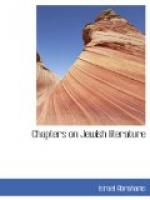It is more certain that the poet was also the singer of his own verses. His earliest audiences were probably scholars, and this may have tempted Kalir to indulge in the recondite learning which vitiates his hymns. At his worst, Kalir is very bad indeed; his style is then a jumble of words, his meaning obscure and even unintelligible. He uses a maze of alphabetical acrostics, line by line he wreathes into his compositions the words of successive Bible texts. Yet even at his worst he is ingenious and vigorous. Such phrases as “to hawk it as a hawk upon a sparrow” are at least bold and effective. Ibn Ezra later on lamented that Kalir had treated the Hebrew language like an unfenced city. But if the poet too freely admitted strange and ugly words, he added many of considerable force and beauty. Kalir rightly felt that if Hebrew was to remain a living tongue, it was absurd to restrict the language to the vocabulary of the Bible. Hence he invented many new verbs from nouns.
But his inventiveness was less marked than his learning. “With the permission of God, I will speak in riddles,” says Kalir in opening the prayer for dew. The riddles are mainly clever allusions to the Midrash. It has been pointed out that these allusions are often tasteless and obscure. But they are more often beautiful and inspiring. No Hebrew poet in the Middle Ages was illiterate, for the poetic instinct was fed on the fancies of the Midrash. This accounts for their lack of freshness and originality. The poet was a scholar, and he was also a teacher. Much of Kalir’s work is didactic; it teaches the traditional explanations of the Bible and the ritual laws for Sabbath and festivals; it provides a convenient summary of the six hundred and thirteen precepts into which the duties of the Law were arranged. But over and above all this the genius of Kalir soars to poetic heights. So much has been said of Kalir’s obscurity that one quotation must, in fairness be given of Kalir at his simplest and best. The passage is taken from a hymn sung on the seventh day of Tabernacles, the day of the great Hosannas:
O give ear to the prayer of those
who long for thy
salvation,
Rejoicing before thee with the willows of the
brook,
And save us now!
O redeem the vineyard which thou hast planted,
And sweep thence the strangers, and save us now!
O regard the covenant which thou hast sealed in us!
O remember for us the father who knew thee,
To whom thou, too, didst make known thy love,
And save us now!
O deal wondrously with the pure in heart
That thy providence may be seen of men, and save us now!
O lift up Zion’s sunken gates from the earth,
Exalt the spot to which our eyes all turn,
And save us now!
Such hymns won for Kalir popularity, which, however, is now much on the wane.




